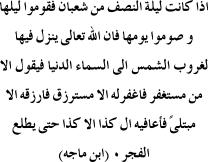Navigation: [ Back ] [ Up ] [ Next ]
There are fourteen places in the Qur’ân wherein
one commonly finds the word “sajdah” written on the margin. Upon
reciting one of these verses, or hearing it recited, it becomes wâjib
(compulsory) to perform a single sajdah. One should stand and say Allâhu
akbar without raising the hands and then perform a single sajdah.
After that, one says Allâhu akbar again and stands or goes into the
sitting position. This completes the sajdah tilâwah.
If one is in prayer and recites one of these verses, one must perform the
single sajdah right away. [BZ]
The companions narrate that, “the Prophet (
 )
used to recite Qur’ân to us and when he came to the sajdah, he would
say Allâhu akbar and perform the prostration, and we would do along with
him.” [M-1031, from Abu Dawud]
)
used to recite Qur’ân to us and when he came to the sajdah, he would
say Allâhu akbar and perform the prostration, and we would do along with
him.” [M-1031, from Abu Dawud]
To perform a prostration on receipt of good news is sunnah
according to some scholars, like Imâm Shâfi’i. However, Imâm Abu Hanîfah
and Imâm Mâlik hold it to be makrűh (reprehensible). [Al-Hadis,
v.3. p.498]
Imâm Ghazzâli mentions in his book, al-Ihyâ,
the performance of certain nafl prayers in the month of Rajab.
Also, he mentions extra prayer during the night of
the fifteenth of Sha’bân, about which other scholars have also indicated its
desireability. However, one should stay away from actions which are innovations
during these special nights and stick to that which is from the sunnah.
The Prophet (
 )
said:
)
said:

“When
the middle night of the month of Sha’bân arrives, then stand during it in
prayer and fast during its day (ie. the fifteenth). For truly, Allâh descends
(figuratively speaking) in this night at Maghrib time to the lowest heaven and
says, ‘Is there anyone seeking forgiveness that I may forgive him? Is there
anyone seeking provision that I may provide him? Is there any sinful one that I
may forgive him,’ and so on until the beginning of Fajr.” [Ibn Majah]
Various other similar narrations can be found describing the virtues of this
night.
Several narrations also indicate the virtue of
staying awake in worship on the nights before ‘Eid. For example,

“Whoever stands (in prayer) on the nights of the
two ‘Eids, with self-examination, his heart will not be dead on the Day when
the hearts will die.” [Ibn Majah, Tabarâni]
Navigation: [ Back ] [ Up ] [ Next ]

![]()